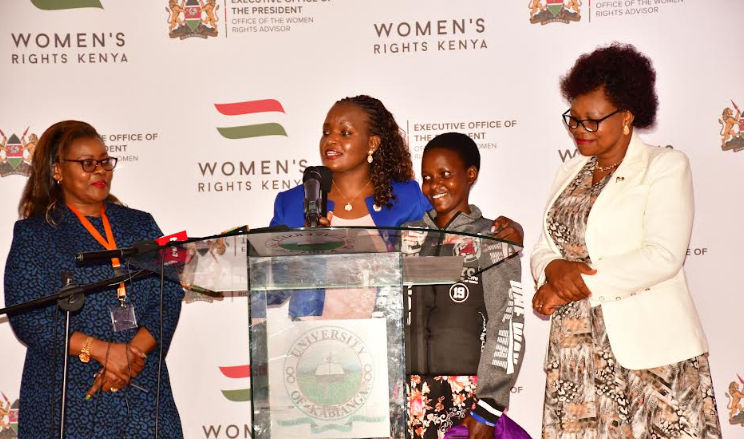Speaking during the official opening of the TFGBV Conference held at Kabianga University, the Advisor to the President on Women’s Rights, Ms. Harriet Chiggai, called for proactive measures in addressing the issues of technology that perpetrate harmful acts against women and children in society.
Ms. Chiggai appealed to the internet service providers, Data Protection Units, and Information Communication and Technology sectors to institute protective measures against vices, including sextortion, cyberstalking, body-shaming, sexual exploitation, trolling, bullying, and online personification that happen every single day to online users.
She further said that technology must be harnessed to protect and empower victims to report incidents and access support services from relevant institutions.
“Let us address specifically the misuse of technology to perpetrate harmful acts against innocent people,” Chiggai observed.
Ms. Chiggai disclosed that 90 per cent of young adults in Nairobi alone have witnessed Gender Based Violence, while another 39 per cent have witnessed it at a personal level.
She further said male students are the primary perpetrators of GBV at 78.6 per cent, followed by female students at 11.5 per cent, whereas male teaching staff are at 5.4 per cent in perpetrating GBV.
However, she urged the students to use technology and social media platforms to prevent GBV cases instead of promoting the vice.
Chiggai said that under the data protection laws under the commissioner of data protection, everyone had the right to access data and delete personal data at will, adding that the 2010 constitution protected citizens from GBV in several ways, including guaranteeing equality and freedom from discrimination.
“The Constitution recognises past patterns of discrimination, such as those related to gender relations, need to be released. The Constitution also guarantees the rights to freedom and security of a person, which include the rights to be free from violence from any source, including the rights to personal dignity,” added Chiggai.
She further pointed out the various laws, including sexual offenses rights, the Protection Against Domestic Violence Act, and the Computer Misuse and Cyber Security Act, which in part prescribe indecent grossly offensive communication as illegal.
“A person found guilty of cyber harassment is liable to get a Sh20 million fine or imprisonment not more than 10 years; ignorance of this law is no defense,” stressed Chiggai.
She was, however, concerned that with all the legislation in place, Gender Based Violence was still on the rise today, noting that at the present there were no laws that specifically addressed Technologically Facilitated Gender Based Violence (TFGBV) in digital space.
“We can use Artificial Intelligence (AI) Powered Early warning systems to help us identify patterns, predict risks, and intervene more effectively,” Chiggai said.
The Kericho Woman Representative, Beatrice Kemei, also graced the TFGBV Conference.
By Dominic Cheres and Kibe Mburu




